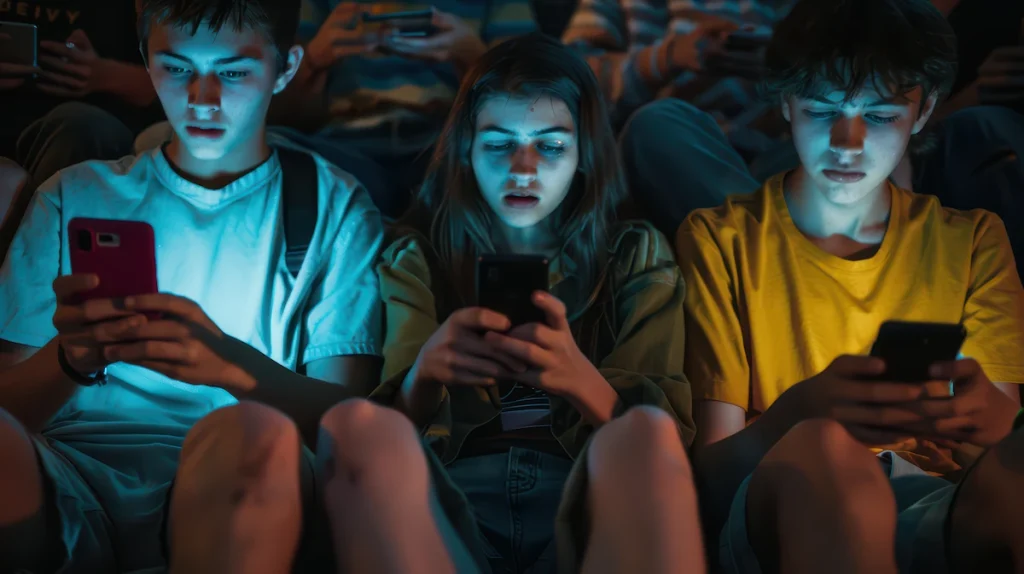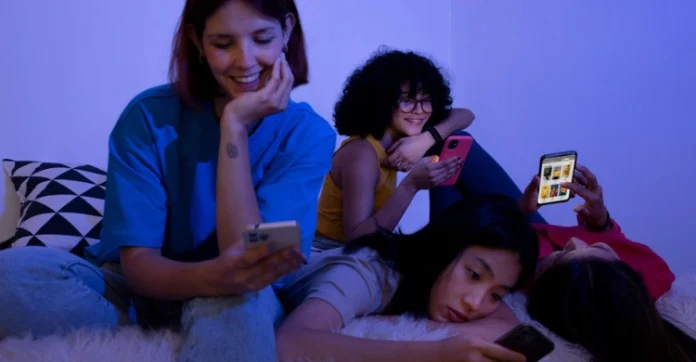Do you find yourself checking your social media repeatedly? Do you scroll through your Instagram or Facebook every night before sleeping?
Social media is a quick way to connect with friends and family. It is an interesting platform to know what’s happening around the world, watch videos, kill time, and interact with friends sitting in another corner of the world. No wonder its popularity has increased significantly over the years among people of all ages.
However, overusing social media can have serious repercussions on your mental wellbeing. Using and enjoying social media is one thing, but getting addicted to it is another. If not handled well, this harmless scrolling can turn into an addiction in no time and disrupt your health and life.
So, let’s understand more about addiction with social media and how to treat it to have a balanced life.
What Is Social Media Addiction?
Addiction is a chronic condition. It can affect our brain and its ability to process things. An addiction creates an urge in a human to do a specific task or take a particular action again and again, even if it’s harmful. It can have dire consequences and may even leave a person incapable of functioning without that addiction or behavior.
Social media can be one such addiction that can harm and influence our mind negatively. We may start using social media excessively and compulsively and gradually become so accustomed to scrolling through social media posts that it can disrupt other aspects of our lives, such as professional, academic, personal, and health.
Social media addiction creates an impulsive need to engage with different platforms and become dependent on them, even when we know it’s affecting our wellbeing. According to a survey, depending on social media can cause symptoms associated with substance use disorder and lead to adverse consequences, such as irritation, lack of self-control, poor mental health, poor relationships, etc.
You must understand that not everyone using social media develops addiction. However, as more people start using social media, chances are high that more people may get addicted to it at some point in their lives.

Why Is Social Media Addictive?
Many consider social media relaxing and fun, but it can gradually influence your thoughts and mind. When you open a social media platform, it increases dopamine signals in your brain, which are associated with pleasure or happiness.
Every time you scroll through your account, you experience more dopamine. Your brain treats it as rewarding, and you are compelled to repeat it every few minutes. It increases when you post something and get an appreciation for it.
As the dopamine wears off, you want to go back to social media to feel good, and this once-harmless activity will soon become an addiction.
The more you engage with social media, the more your brain tells you to repeat it, as it reduces loneliness. However, in reality, you are disconnecting from your surroundings, including family and friends, and isolating yourself.
Also read: Negative Effects of Social Media on Our Brains (Bad Impacts)
How to know if you are addicted to social media?

Most people around the world have easy access to various social media platforms.
A statistics report states that as most of us actively use social media, determining if a person’s habits are addiction or normal is challenging. However, there are a few points that can help you know if you have an addiction towards social media or not. Let’s take a look:
- Increasingly using social media while hanging out with friends or family.
- Getting angry or irritated when social media usage is reduced.
- Your job or studies are being affected by the overuse of social media.
- Thinking about social media even when you are not using it and checking it as soon as you get the opportunity.
- Relying heavily on social media to cope with certain situations or issues.
Also read: How to Overcome Social Anxiety? 5 Strategies and Tips
What Are the Effects of Social Media Addiction
There is no denying that social media is enjoyable, but it comes with many drawbacks. If not controlled on time, addiction of social media can have serious consequences that can take a huge toll on your mental and physical health. The downsides of social media addiction include:
1. Reduced Attention Span
As social media offers ample content on varied platforms, users constantly scroll through the platform, skipping from one video to another within seconds. They hardly see any video for more than 8-10 seconds. This reduces attention span, which is evident in other aspects of life, such as studies and job.
2. Eating Disorders
Social media creates an unrealistic standard of beauty, influencing people and compelling them to take harmful actions to meet those standards. Hence, it has the potential to cause eating disorders, especially in younger generations.
3. Loneliness and Isolation
Although social media connects you with people around the world, it can also create a feeling of isolation and loneliness. As per a report, around 35% of young people admitted that they feel lonely most times despite spending at least three hours on social media. Social media communication has replaced traditional and personal connections between people, which often makes people feel lonely.
4. Disconnected from Surroundings
We have all seen or experienced a scenario where people are so consumed in their social media interactions that it distracts them from connecting with people around them. Most social media users are now busy gaining more likes and comments on their posts. They are not aware of their surroundings at all and miss many valuable moments.
5. Compulsive Accessing
Do you feel the urge of checking and accessing your social media every few minutes? Well, this is one of the major social media addiction effects, where people want to check their Facebook or Instagram accounts again and again without much thought. This may happen even when they are out with friends and family.
6. Circadian Rhythm Disorder
Circadian rhythm is a physical, mental, and behavorial changes in our body that follow 24-hour cycle. It nudges us to do certain activities at specific times and the most important of these is the sleep-wake cycle.
Melatonin is a chemical involved in the circadian chemicals that makes us feel drowsy. It responds to light and day, so our pineal gland starts releasing melatonin in the evening that peaks at night, which tells us it’s time to sleep. By morning, it gets minimal so we wake up feeling fresh.
However, when we are consumed on social media, even late at night, it affects the circadian cycle and our whole sleep-wake cycle. We avoid sleeping till late and wake up feeling tired and lazy.
7. Obsession with Self-improvement
Social media is filled with beautiful and picture-perfect images. This can make people feel disappointed and dissatisfied about their own looks and lives. They want to achieve perfection and unachievable levels of perfection. They want to create a life that looks perfect on social media but is far away from reality.
8. Unhealthy Relationships
When a person spends more and more time on social media, their family and friends can get frustrated and drift apart. Social media addiction compels you to spend more time on social media than with real people, and you will soon find yourself making excuses to escape from people around you to access social media.
9. Anxiety and Depression
Many people start comparing their lives with others they connect with on social media. They develop feelings of inadequacy and low self-esteem, which can cause depression, anxiety, and neuroticism.
10. Mental Health Issues
We often see social media addiction in teens, which hampers their studies, focus, and health. When they engage too much with social media and constantly think about it even when they are not using the phone, it can affect their mental health and lead to severe health issues, such as depression, social anxiety, etc.
11. Dryness in Eyes
Needless to say that using mobile phones for long hours is not good for the eyes. It causes itchiness and dryness, which affects the vision. Hence, most people wear anti-glare glasses to protect their eyes.
12. Cognitive Effects
Social media can also lead to various cognitive issues, such as a reduction in the ability to concentrate and memory retention.

Also read: How to Stop Overthinking & Negative Thoughts?
How to Avoid Social Media Addiction?
Fortunately, there are multiple activities that you can incorporate into your daily routine and improve your lifestyle. If you are using your phone excessively and wondering how to get rid of social media addiction, these tips will help you build a better and healthier relationship with your smartphone.
1. Set an Intention
The first step is to have a clear intention and determination to change your relationship with social media and phone. Set goals and write down steps to follow to detach yourself from the virtual world. Uninstall apps and keep your phone away while sleeping.
2. Disable Notifications
Any kind of a trigger can lead to habitual actions and addiction, and social media notifications are one of them. When a notification pops us on your screen, you want to check your phone once no matter what you are doing. You want to see what others are up to. So, allow your mind a little more breathing space by disabling notifications. Invest your mind and time in other important tasks.
3. Practice Self-control
Self-control is the key to overcoming any addiction and can yield amazing results within a few weeks. It is one of the first steps to avoid social media addiction, where you limit the time you spend on your phone or social media. Initially, it will be challenging, but through meditation and breathing exercises, you can control your actions and addiction and become mindful of your behavior while accessing any app.
4. Build Helpful Hobbies
We agree that social media has a lot of benefits and can help us in many ways, but when we start spending too much time on these platforms, it can harm us more than do any good. So, to let go of this habit, develop fruitful interests and hobbies that contribute to your studies, career, and health. Find out what you like and enjoy doing that doesn’t involve phone or social media. Meditate regularly, practice breathing exercises, and do activities that help you find purpose and meaning in your life. You will get in touch with yourself and feel less influenced by external factors.
5. Meditate and Reflect
Take a moment and think about whether you are truly happy with your relationship with social media. Does it bring real joy? Or do you want to get rid of this addiction? If you think social media is harming your mental peace and you can’t be offline even for an hour, then it’s time to work on yourself. Join a meditation course or Yoga Programs to build focus and reflect on your habits.
6. Spend More Time with Friends
Try to connect with friends and family around you. Spend more time offline and spend quality time with loved ones, indulging in fun activities, like board games or quizzes. Talk to people around, discuss books, plan outings, start gardening, and go for hikes.
7. Involve in Physical Activities
Start spending the majority of your time in physical activities, such as exercise, meditation, outdoor games, etc. Even a 10-minute walk or stretching can do wonders if done regularly. Meet people for dinner rather than just liking and commenting on their posts. Talk to your friends on a call and build deeper relationships. This will divert your mind to something positive, and as you move your body, endorphins will be released, which are a great alternative to dopamine.
8. Practice Mindfulness
Mindfulness allows you to be present in the moment and observe everything happening around you, so you think carefully before acting on your urges. This helps you overcome addictions and develop healthier habits and daily routines. Practice breathing exercises for 10-15 minutes every day. It will make you aware of your cravings and attract you more toward a calm life that is free from the virtual world. You will make better choices and break bad habits.
9. Digital Fasting Every Week
Sometimes, we allow our brain a break and even our stomach. Hence, we take off from work or do fasting to feel healthier. Similarly, practice digital fasting at least once a week, where you have no screen time. Don’t use your smartphone or laptop and get consumed in activities that don’t require screens. Play games, read, spend time with family, go for a walk, exercise, and meditate. You will gradually feel more peaceful and present.
Join the online yoga programs by hellomyyoga
FAQs- Social Media Addiction
Of course, using and scrolling social media excessively leads to social media addiction. However, there are other social media addiction causes that you must know. These include depression, low self-esteem, lack of affection, personal dissatisfaction, and hyperactivity. People, especially the younger generation, often try to replace affection and love with likes and positive comments on social media.
Social media addiction is a behavioral pattern in which people are constantly concerned about social media and driven by an uncontrollable urge to check or use social media every few minutes. They devote most of their time and efforts to social media, which they must invest in their studies, careers, or other areas of life.
Yes, using social media excessively can result in an unhealthy lifestyle and poor physical health. Social media addiction can lead to decreased physical activity and unhealthy habits. It also causes poor posture and eyesight. Social media addiction has also been linked to obesity, laziness, lack of physical workout, heart disease, cardiovascular disease, reduced bone density, high blood pressure, and juvenile osteoporosis.
Some of the symptoms and signs of social media addiction include:
– Restlessness and irritability when you are not using social media.
– Checking your phone every few minutes or whenever you get the opportunity.
– Reduced productivity and efficiency at work or poor marks in academics due to overuse of social media.
– Increased anger issues when you reduce social media usage.
– Constantly using the phone while consumed in other activities, such as exercise, hanging out with friends and family, working, studying, and eating.
– Relying on social media as a way to cope with a problem.
– Thinking about social media even when you are not using it.
Addiction to social media can lead to various mental health issues, such as:
– Isolation
– Cyberbullying
– Feeling inadequate about life or appearance
– Neglecting real-life relationships
– Fear of missing out
– Disrupted sleep
– Reduced physical activity
– Poor concentration and memory
– Lower self-esteem
– Increasing anxiety
– Poor performance at work
– Negative impact of studies
– Loneliness
Conclusion
Once you are free from the clutches of social media, you will see drastic improvements in your life and feel real mental peace. You will be able to focus better on your work and have more sound sleep. Also, you will work more on real-life relationships and find pure joy in your surroundings.



